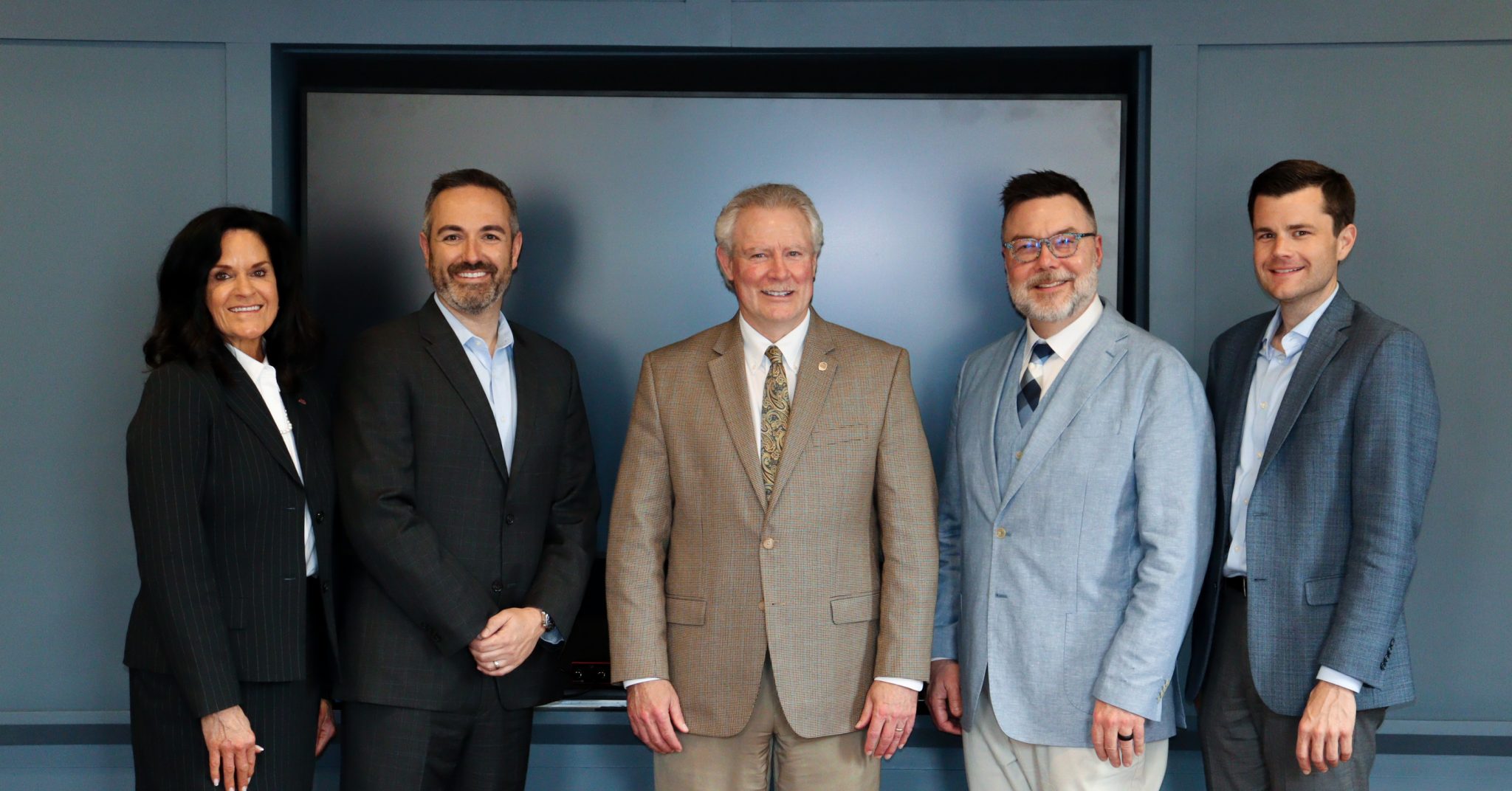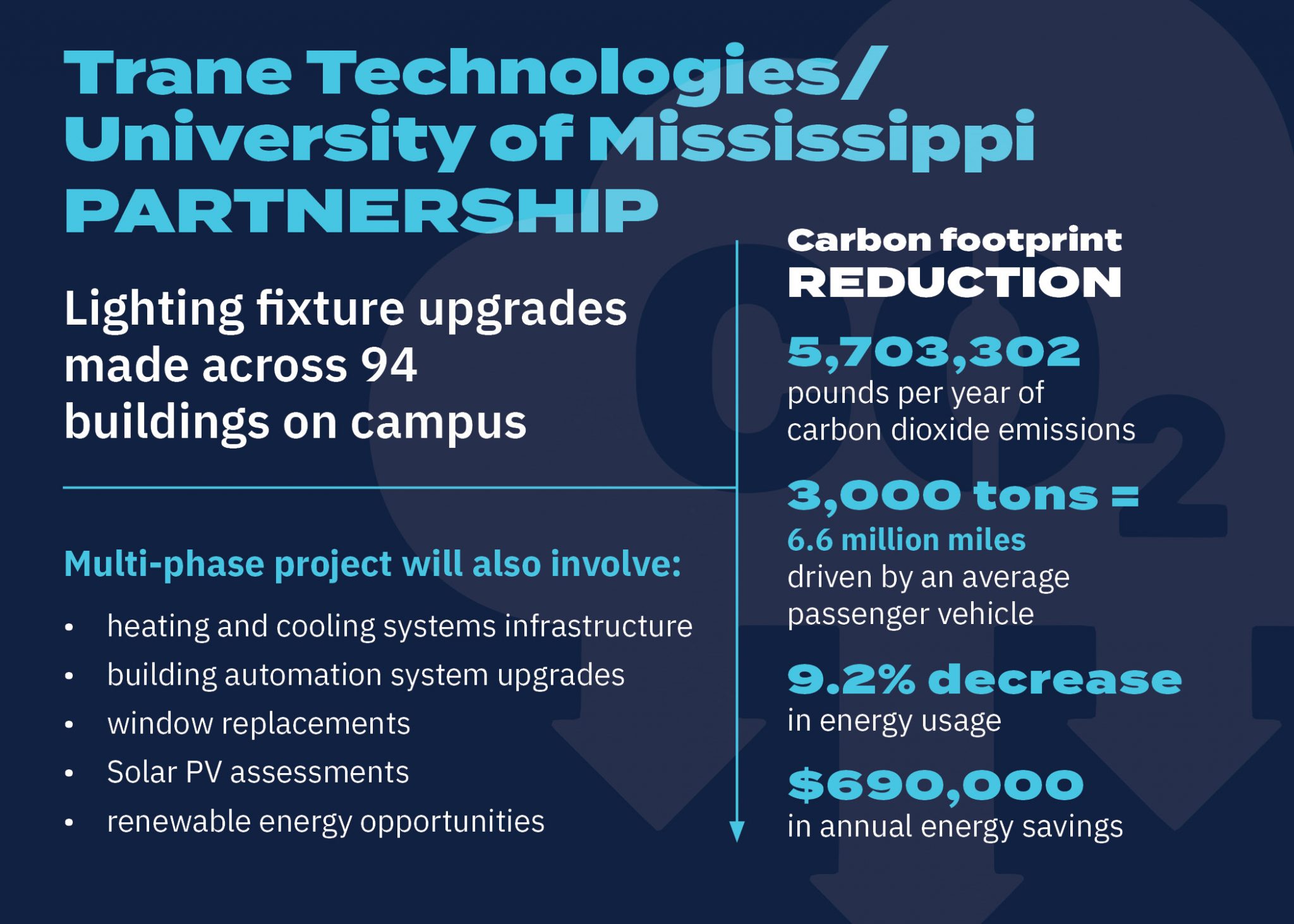
Trane Technologies representatives (from left) Nancy McBee, business development manager for energy services, and Adam Wittwer, vice president of Energy Services for Trane, visit with University of Mississippi Chancellor Glenn Boyce; Steven Holley, UM vice chancellor for administration and finance; and Hughes Miller, UM director of industry engagement. Trane and Ole Miss are investing in a large-scale energy savings project. Photo by Mary Knight/University Development
OXFORD, Miss. – The University of Mississippi and Trane – by Trane Technologies, are investing in a more sustainable future by supporting educational initiatives and entering the next chapter of a large-scale energy savings project.
As the university’s energy services provider, Trane began assessing and implementing opportunities for energy savings and building systems improvements in 2022. Their on-campus engagement with students and faculty has also led to a new initiative that will promote STEM learning, provide professional development and experiential learning for university students and grow the university’s environmental studies program.
“Working with Trane, we are able to make a significant, positive impact on our campus, on the lives of our students and on the planet,” said Ian Banner, director of facilities planning and university architect.
Adam Wittwer, vice president of energy services for Commercial HVAC Americas, Trane Technologies, said the company’s goal is to “deliver outcomes that matter” for its customers and communities.
“For the University of Mississippi, that means supporting the university’s ambitious sustainability goals, complex infrastructure needs and real-world learning experiences that cultivate the next generation of green and STEM professionals – all of which are deeply aligned with our own 2030 Sustainability Commitments,” Wittwer said. “We are honored to expand our collaboration with Ole Miss as we work together with administration, faculty and students to help create a more sustainable future for us all.”
The first phase in the energy savings project involves new energy management controls and equipment improvements for the J.D. Williams Library, Faser Hall and the Thad Cochran Research Center. Phase 1 will result in more than $73,000 in annual savings and is scheduled to be completed in June 2023. 
Phase 2 will soon kick off with a comprehensive lighting fixture upgrade, which will replace light fixtures in 94 campus buildings. The upgrade is expected to reduce the university’s carbon emissions by nearly 3,000 tons, the equivalent of more than 6 million miles driven by an average passenger vehicle.
This is the most comprehensive lighting upgrade project ever implemented at Ole Miss, said Kendall McDonald, associate director of the Office of Sustainability.
“Electricity usage is the university’s most significant, routine source of emissions, so reducing this by any means necessary is the first step towards implementing carbon neutrality on our campus,” McDonald said.
As a result of this project, the university anticipates a 9.2% reduction in annual energy usage, which equates to more than $690,000 in energy savings per year. Those savings will be used for future sustainability improvements across campus such as new heating and cooling systems, window replacements and other renewable energy opportunities.
The departments of Facilities Management and Facilities Planning, and the Office of Sustainability have worked closely together to bring industry best practices for energy management, efficient building systems operations and climate responsible renovation and new construction projects to the university.
Dean Hansen, director of facilities management, and Mike Dunnavant, associate director of facilities operations, began working with Trane after developing a process to enable large scale upgrades to building operating systems in 2021.
“This project will result in the University of Mississippi making great strides toward sustainability goals of a reduced carbon footprint and modernized learning and working environments for the Ole Miss community,” Dunnavant said. “It is an honor to work together with my colleagues at the university and with leaders at Trane to begin this long-needed effort.”
Since collaborating with the university on energy savings, Trane has quickly become one of the most-engaged industry partners on campus, said Hughes Miller, director of industry engagement. Their employees have visited campus frequently to mentor student capstone projects, provide case studies and participate in panels.
This shared interest in STEM learning and career readiness culminated in a $300,000 grant made in part by the Trane Technologies Foundation to begin a multi-year educational initiative targeting K-12 students and Ole Miss students alike.
A key component of the grant is to develop a sustainability-focused engineering elective, while also helping to increase existing course offerings for the environmental studies minor, which is housed in the College of Liberal Arts.
The university will support faculty and graduate students to develop and deliver an engineering-focused course on sustainability that will be accessible to upper-level students in STEM majors, said Cris Surbeck, chair and professor of civil engineering and acting chair of chemical engineering.
“Students will learn about the environmental life cycle analysis of activities and products that reduce greenhouse gas emissions, and the three p’s of sustainability: people, planet and profit,” Surbeck said.
The Engineering Summer Academy, a program designed for rising high school sophomores, juniors and seniors considering engineering, will introduce participants to life as an engineering major by engaging in demonstrations, hands-on activities, short lectures, team-based problem solving and lab tours.
UM students will also receive real-world learning experiences and professional development through programming in the engineering and business schools.
“Having support from Trane Technologies helps us commit to providing sustainability education in the long term,” Surbeck said. “I’m excited also to have Trane employees participate in our education process and keep us updated on the state of the practice of sustainability in manufacturing.”